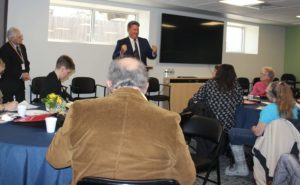A frank, engaging conversation about aging and the challenges of housing, mental health, and nutrition for older adults was held at Coastline on Friday during a legislative breakfast to support the work the nonprofit does in the community.
Led by U.S. Rep. Bill Keating, D-9th, the event included participation from area legislators, elected officials, health care, social service and councils on aging professionals throughout the South Coast. 
“There’s a great need more than ever to address the issues that you work on here at Coastline,” Congressman Keating told attendees. “This is the time to be preparing, not just waiting for a crisis because, in many respects, we have a crisis now.”
In his comments, Congressman Keating decried efforts to undermine Social Security in the U.S. telling people to be wary of comments about the debt ceiling which are intended to push forward a move to cut the program.
“Think long and hard about what they’re talking about,” he advised attendees, adding that cutting benefits or raising the qualifying age of Social Security is unnecessary because the program is solvent.
“You pay into it all these years and there’s a promise that has to be kept,” he said.
Coastline CEO Justin Lees, who was master of ceremonies for the event, offered his thanks to all who came out to address these important issues.
“We want to thank the South Coast delegation and Rep. Thomas M. Stanley, co-chair of the Joint Committee on Elder Affairs, for the support they continue to offer older adults in this region,” said Lees. “As Congressman Keating pointed out, the number of adults over age 60 is 73 million and will reach 108 million in the next 20 years. These are numbers the U.S. has never seen before. If we are to truly address the mental health, nutrition and housing needs of our older populations, Coastline and other aging services organizations need increased support now.”
“Coastline has seen significant increases in the number of meals we serve over the past decade,” said Michelle Beneski, president of the Coastline Board of Directors. “The need among older adults continues to increase. Food and operational costs are also increasing. We’re asking that our state legislators push to keep investing into the state budget line item and support the work we do.”
Christine Cernak, executive director of integrated care management for Southcoast Health, described the many ways the hospital system, and specifically its emergency department, are asked to fill gaps in existing care systems in ways that impact their ability to provide ongoing medical services.
“We’re overwhelmed with the number of individuals with dementia that are being left in the emergency room by family because family cannot manage them at home,” she said.
Housing issues also affect the organization, specifically when and how people are discharged safely. In one instance, Cernak said, Southcoast Health’s community health staff went to retrieve a patient’s belongings from a dumpster, when the person had been evicted while in the hospital.
“Think about trying to transition that individual to the next appropriate level of care when there is no home to go to,” Cernak said. “It is incredibly difficult.”
Caroline Mazzei, behavioral health clinician at Coastline, described the many incremental steps necessary to connect people who have existing mental health challenges to care and how slow movement forward can be both successful and a deterrent to reaching more of those in need.
“Unfortunately, there are just too many people out there that need our help and they’re not being addressed. They’re being overlooked,” she said.
For example, Mazzei said, an individual who resists personal care assistance even when they desperately need it, may do so because of a past history of sexual abuse.
“At face value, we’re seeing this person as difficult, resistant, and non-cooperative, but in fact there’s something going on that was never resolved,” said Mazzei.
Unaddressed needs impact other community organizations and services including hospitals, police departments, real estate and others, she said.

In years past, Sen. Montigny said, he observed “hordes of lobbyists who were not paid, and they were called senior citizens.”
“It is so essential that you all answer the question that was asked, ‘What are you all going to do to help us,’ he said.
Coastline extends its thanks to all of the legislators and elected officials who attended the event and to representatives from many area agencies and organizations who participated. A very special thanks also goes to our generous event sponsor, Commonwealth Care Alliance.

Recent Comments